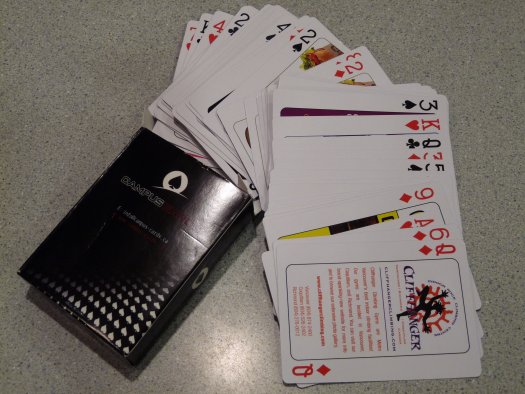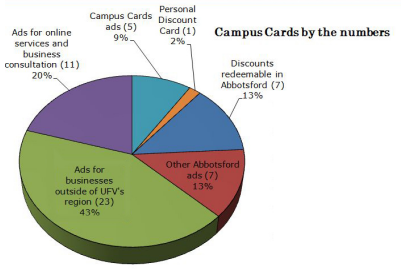By Nick Ubels (The Cascade) – Email
Date Posted: September 22, 2011
Print Edition: September 21, 2011
As advertisers develop increasingly clever ways to win over the coveted and hard to reach 18-24 year-old student demographic, one BC company is trying a different approach to bring their clients closer to campus.
Campus Cards is a new marketing venture that aims to advertise to students through an untested medium: playing cards.
30,000 decks, all featuring advertisements for a variety of businesses, will be handed out to students at UFV, UBC and SFU this year. Each deck has 54 cards with ads in place of the usual faces and symbols, though the decks are still playable.
That’s 1.62 million additional ads in circulation in the Lower Mainland.
This is not the first time that Canadian advertisers have sought new ways to market to college students in recent years.
In 2005, the Toronto Star reported that McGraw-Hill Ryerson Ltd’s Canadian division had backed off a proposed plan to include ads in university and high school textbooks after public criticism and an admonition from its parent company.
Campus Cards is the Canadian affiliate of Student Decks, a U.K. company that has found some measure of success in its three years of operation, but had yet to find any partners to expand its reach across the Atlantic.
Distribution at UFV was handled by the Student Union Society and other student organizations in exchange for an ad placement in the deck. The 10,000 decks set aside for UFV were included in orientation packages and handed out at the Welcome Back Barbeque the first week of classes.
Adam Currie and Tuong Thai – two fourth year Business students at UFV – are the sales managers behind the Abbotsford deck. They say that the decks are intended to provide students with an increased awareness of student-friendly businesses in the community.
“It’s just a functional deck of cards that people can use and it has advertising for local businesses on it – either advertising or discounts,” said Currie. “Even if they don’t use the discounts, it’s a free deck of cards.”
“We want to give students the opportunity to save money, either in food or services,” added Thai.
Student reaction was decidedly mixed. Many shared the viewpoint of Mitchell Martin, a Business Administration student who told The Cascade that the advertising on the decks did not affect him personally because he was unlikely to use the cards.
“Honestly, they’d probably sit in my room for three years and then maybe one day I’d go camping and use it,” he said.
Martin indicated that he – like many students – was resigned to the fact that advertisements are going to be all around.
“My only question is: what are they doing with the money, and is that helping students in any way?” he added.
A segment of the students approached by The Cascade voiced strong concern over what they perceived as an encroachment on their right not to be advertised to while in an educational environment.
“It’s insulting,” said Tristan Smith, a third year arts major. “You feel a little invaded, but you really have to wonder what you can possibly do.”
Freshman Media and Communications student Elisabeth Poulson and her fellow first-year student Colton Muma called the decks were a “waste.”
“At first we thought they were coupons, and then we realized they were just ads so we threw them away,” said Poulson.
At least one student was enthusiastic about the deck. Sarah Williams, a regular card player, said that she thought the cards were “cool” and she would probably use them.
When asked if she thought the ads would be distracting, Williams responded that they might, but it was a fair trade-off for the promotions included in the deck.
While the decks are being pitched to UFV students as a fun opportunity to save money on necessary items, the advertisements contained within tell a different story.
Out of the 54 cards in the deck, 22 feature Vancouver businesses and 14 advertisers are from Abbotsford. Of these Abbotsford cards, three promote on-campus services and only seven cards include discounts that can be redeemed in Abbotsford. These seven cards represent three offers: a $4.99 pita at Pita Pit, 20 per cent off salon products or services at Knock Outs hair studio, and a free teeth whitening procedure for new patients at Dr. Lo’s Dental Office. The remainder of the deck consists of online consultation and stock quote services as well as redirects to Campus Card websites.
According to sales manager Tuong Thai, this is because the pair of UFV students only had two months to solicit advertisers for inclusion before the cards had to go to print.
UFV Advertising and Marketing professor Cindy Stewart said that once students realize that there are few discounts being offered, they will not continue to browse the deck.
“The novelty factor’s very high,” she said. “Students have no money. They’re looking for discounts on food, books, supplies, money off movie tickets, and draws to enter.
“They just have a disconnect between what’s in the deck and the audience.”
Fellow Business professor Kim Milnes agreed, saying that the repetition of certain cards was sure to make some students give up.
“This is the function of this generation: to not like to be advertised to,” she said.
Milnes also explained that the main ethical issue surrounding the Student Union Society’s (SUS) agreement to distribute the cards on campus was to make sure there was some oversight concerning products and services advertised in the deck.
“You have to make sure it’s not considered an endorsement,” she said. “Are they willing to abstain from choosing the advertisers or do they want to be engaged?”
SUS communications administrator Jhim Burwell said that when he was approached by Campus Cards in February, he was assured that there would be “nothing untoward or [that] would bring disrepute to the deck itself.”
The motion to support the venture was brought before the Executive Board and passed on February 25.
President Carlos Vidal wanted to clear up any misconception that the Student Union’s distribution deal might signify their endorsement of any of the products or services also advertised in the deck.
“I hope people don’t think this is completely supported by us,” he said. “We’re advertising ourselves in there; we’re not saying we support everybody else.”
Although the agreement was reached before his administration took office in April, Vidal was behind the idea because of the involvement of UFV students. He also saw it as a way to “enhance student lifestyle.”
“If it was somebody who was not related to UFV at all, it probably wouldn’t have been supported in the way that it is by SUS,” he explained.
Vidal indicated that the arrangement will have to be re-examined by the Board each year, an event which he sees as an opportunity to provide input as to what they would like to see on the cards.
“I think it would be cool to see local businesses more on these and consistently staying on here,” he added.
Campus Cards’ pitch to advertisers is simple. According to Thai, $800 buys you one ad and that ad will be seen by 30,000 students across the Lower Mainland as well as any friends they might play cards with.
The company claims that 60 to 70 per cent of university students play cards on a weekly basis. Adam Currie pointed to the website of their UK affiliate Student Decks, which boasts an even higher number of 77 per cent.
When asked where these statistics came from, neither Student Decks nor Campus Cards was able to produce any study or further explanation. This information could not be confirmed through independent sources.
Of the eight UFV students The Cascade approached for comment, only one said that they played cards on a weekly basis.
On one section of Campus Cards’ official website labelled “Targeted Advertising,” the company urges their clients not to, “miss the opportunity to create a lucrative and loyal customer base.”
Rob Macquisten, one of the directors of Campus Cards, responded to questions about this element of their strategy by saying “targeted advertising is for our clients and that’s what they want to hear. We want to cater not only to our clients but students as well.”
Some students have taken offence to such advertising practices on campus.
“As a student, our complicity is [being] offered without consent,” said Tristan Smith. “It’s the exact same feeling you get from finding out Facebook takes in everything you write down on it to cater ads to you.”
Abbotsford sales manager Adam Currie also compared attaching ads to a free, functional product such as theirs to online advertising methods.
“Like Facebook, you get advertising and stuff like that. We’ve just taken that Internet concept and made it physical,” he said. “We still abide by the University’s ethical standards. Notice we’re not advertising cigarettes.”
When asked whether this year’s deck would open the door to big business advertising on the decks in the future, Currie said that Campus Cards would be pursuing them to a certain extent.
“By no means will we fill the entire deck of cards with big businesses, but we will not exclude them,” he said. “However, that is a topic we do not wish to comment further on.”
What do you think of Campus Cards? Did you pick up a deck? Will you use them? Are you concerned about the level of advertising on campus? Email nick@ufvcascade.ca with your reactions for inclusion in next week’s issue.




